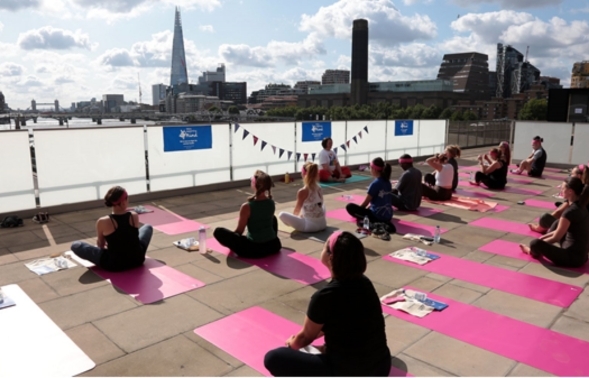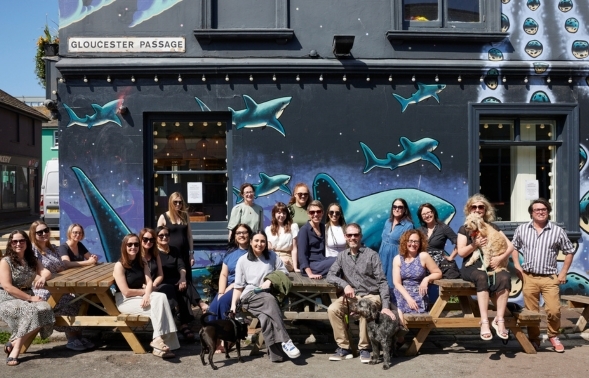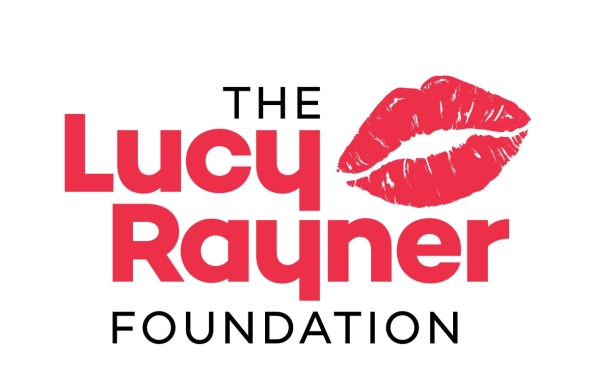Monika is a nurse at St Catherine's Hospice in Crawley. As well as working on the wards, she acts as a mentor to student nurses on placement at the hospice, helping to train the next generation. Here she shares her experiences and what she gains from mentoring.
"I was first inspired to work in a hospice when I was training as a nurse in Poland. We had a visit from a lady who worked in a Polish hospice, and I was really moved by the way she spoke about the care she gave patients; it was very personal and almost family like. She spoke about how she helped patients fulfil their wishes and I've never forgotten the story she told us about a lady whose dying wish was to buy a red dress. She had always wanted one. Staff did a collection and brought her a red dress, which she ended up being buried in.
Later, I came across some Polish books written by someone who founded a hospice, and as I was qualifying, I became more interested in working in palliative care.
As well as working at St Catherine's I do some shifts at a local hospital
Misconceptions about hospices and the care we provide are prevalent there. It's quite common for people to think hospices are all about people dying and a depressing place to work, but I always focus on what I can do for people, not what I can't.
It's so important for students to spend time at St Catherine's because when they're here, they see hospices aren't like they imagine. I'm passionate about raising awareness of hospices and their work and when you're newly qualified you need to see what palliative care in this setting is like.
Hospice care is very much about dignity in dying
Working in a hospice you learn about symptom control and see the dignity and personalised care that people are given.
Students can be at St Catherine's Hospice from two weeks to two months and during their time with us, they work across all our hospice teams. I try to support them in all aspects of their learning as a lot of our students have other commitments alongside their studying.
I put myself in a students' shoes and think how would I like to be taught?
I like to make students think on their feet. To try and help them understand anatomy and physiology related to a specific condition, and I ask them to question themselves as they work: What does that particular patient need? What treatment would they suggest for them? That way, I teach them that routine can't ever take over. Each person we care for is different so I remind them that they always need to think, What can I do? How can I do this? And I like it when they make their own corrections as they go.
Students spend time working on the wards alongside me, but also spend time with our occupational therapists, physios, emotional, spiritual and welfare teams, and community nurses as well as with other nurses and nursing assistants.
Mentoring is very much about teamwork
It's important to give students the chance to spend time with all of our teams so that they get a rounded learning opportunity and experience every part of our hospice.
I like to teach people and pass on my knowledge. I enjoy making connections with students and I try to understand them individually. Everyone learns differently so I adapt my teaching style to meet each person's needs, and give them protected time as it can be hard juggling their time when they're here.
The hospice is an emotionally loaded environment so I'm there for students' emotionally too. I or another member of staff will always make time to have a conversation with a student who may be struggling - we've all been there. I find ways to help them the best I can. That could be taking them off the ward for a few hours or the whole day.
You have to be aware that for each person you're mentoring there may be different triggers. Recent bereavement, for example. Once, I was working with a student who lost her father to a brain tumour. If they're then caring for someone with a similar condition that can make things hard for them
Working at a hospice is different to working in other places
It can sometimes be a challenging environment, so I'm always honest with students, but in a way that doesn't discourage them. I pass on tips and advice. For example, lots of families have questions for us, so I tell students to explain to each family what they're doing and show them their loved one's drug charts so people understand why we're doing what we're doing. It's understandable that some people are going to question the care we're giving. Many of them have been looking after their loved one at home before they come to the hospice, and some of them find it hard to give up control over their care. Teaching students to do things like show people drugs charts also teaches them to protect themselves when they're delivering care.
Students needs your time
In Poland when I was training, I had a very good, kind teacher and they were quite inspirational for me. I hope I'm the same for the students I teach here.
Whenever I'm able to sign off a student I always get a feeling of achievement. I like thinking that someone may remember an experience I've shared with them when they go on in their career, like I remember the experience the lady shared in my training about her patient's red dress.
I'm always very proud of all the students I mentor
They're very brave, communicating with new patients and families, and taking on new challenges, some that they've never done before. I've had some lovely students and find mentoring them, getting them from A to B and seeing them learn very rewarding. It's rewarding to see them get more confident and independent as they go."
To find out more about the work of St Catherine's Hospice please visit: www.stch.org.uk

















